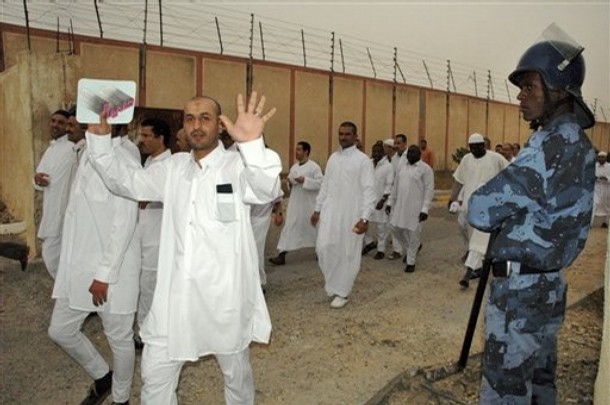
Libyan Islamists Back Away from al-Qaeda Merger in Reconciliation with Qaddafi Regime
Publication: Terrorism Monitor Volume: 7 Issue: 17
By:

It has been more than two years since talks started between the Libyan authorities and the imprisoned leaders of the Libyan Islamic Fighting Group (Al-Jama’a al-Islamiya al-Muqatilah bi Libya – LIFG). As both sides acknowledge past mistakes, there are finally signs that the longtime antagonists may be getting closer to reconciliation, a process that will rely in part on the LIFG’s renunciation of its merger with al-Qaeda.
Dr. Ali Sallabi, a Qatar-based Libyan Islamist and the main mediator between the imprisoned LIFG leaders and the authorities, has been quoted as saying the talks “are very encouraging” after meeting the six Shura Council members of the LIFG in their Tripoli prison (Dar al-Hayat, June 15). The six leaders have for some time been allowed by the security services to meet freely with the rest of the Islamists in prison so they could consult with them regarding a review of LIFG policies and principles. The six are writing a religious study that is expected to be published in August. This study, similar to al-muraja’at (“revisions”) released by other jihadi groups in the Arab world, will refute from a religious point of view the ideology and methods of Osama bin Laden’s al-Qaeda, according to Noman Bin Othman, a former leader of the LIFG (Dar al-Hayat, June 15).
This positive news coincided with the announcement by another former leader of the LIFG outside Libya that he now supports peace talks with the government. Abdullah Mansour (a.k.a. Abdulbasit Abdulrahim), who was described in his 2008 terrorist designation by the U.S. Department of the Treasury as “one of the most important LIFG members working on LIFG finances in the UK, where the greatest amount of funding for the LIFG originated,” has written a letter published by al-Hayat in which he commented publicly for the first time on the reconciliation talks (Dar al-Hayat, June 11). [1] The importance of Mansour’s position stems from his “religious credibility” – he was responsible for the LIFG’s Islamic Jurisprudence Committee while based in Saudi Arabia in the 1990s.
Mansour considers a hand-written letter sent from prison in March by the Amir of the LIFG, Abu Abdullah al-Sadeq, as proof that the talks are serious (oealibya.com, March 12). According to Mansour, the letter makes clear that the leadership of the LIFG has pledged “to renounce the method of military confrontation with the regime and to do a revision of its literature and its past policies” (al-Hayat, June 11).
Mansour defends the methods of the LIFG in the 1990s, saying the group had no option but to use violence. He also states that, despite its pledge to support other Islamic groups, the LIFG refused to join with Bin Laden in his “Global Jihad” because the group always considered establishing an Islamic Libyan state as its aim (making it a local rather than global jihad).
The regime itself is changing in Libya, according to Mansour, with Colonel Qaddafi saying publicly that mistakes have been made, and the leader’s son, Saif, also acknowledging the state manipulation of court decisions as well as the excessive role played by the revolutionary committees. So, if the regime is changing, why not the LIFG? Mansour says to the members and leaders of the LIFG, inside and outside Libya, that they should not shy away from correcting their mistakes too: "Revision is a religious need, whether the LIFG (leaders and members) stay in prison or are set free. Changing policies and aims does not mean a retreat from the religion itself.”
Furthermore, there is speculation that an important statement from the LIFG is forthcoming. This author is aware of messages that have been delivered from the leadership of the LIFG inside Tripoli’s Abu Salim prison to group leaders who are “keeping a low profile” in the West. Those leaders outside Libya are expected to clarify the position of the LIFG on two main issues; the first decision is whether or not to endorse the LIFG leaders who are talking with the government as well as their planned “revisions.” Secondly, the group leaders abroad must decide whether or not they endorse the merger between the LIFG and al-Qaeda, announced by Abu Laith al-Libi in November 2007.
•Regarding the first issue, the LIFG is likely to argue (as did Mansour in his letter to al-Hayat) that “revision” of the movement’s ideology is not something to be disliked, but rather encouraged. Therefore the leaders of the LIFG inside Libya’s prisons should rest assured that their planned revisions are not going to be rejected by the leaders of the group in exile. The leaders in exile are also likely to call on the government to give the revisions the response they deserve, leading to the liberation of the imprisoned Islamists and the opening of the political system inside Libya in order to allow Islamists to play a legitimate political role instead of being driven underground.
•It is expected that the debate over the al-Qaeda merger will be resolved by stating that Abu Laith did not have the authority to announce the amalgamation. Abu Laith should have gotten the support of a majority of the Shura council, something which he clearly did not have. Therefore, the LIFG is likely to say that there has been no proper merger with al-Qaeda and the Libyan group is in no way part of Bin Laden’s Global Jihad.
This distancing of the LIFG from al-Qaeda would benefit its supporters in the West in particular, who are being squeezed by security services that fear the LIFG leaders are part of an al-Qaeda “sleeper network.” The Libyan regime itself would also benefit from such a statement, which would send a clear warning to youth who may be thinking of joining al-Qaeda’s “jihad”; in plain words they should be careful of joining a cause which does not even have the support of the main Libyan jihadi group, the LIFG.
Notes:
1. United States Department of the Treasury, “Three LIFG Members Designation for Terrorism,” October 30, 2008; https://www.treas.gov/press/releases/hp1244.htm





